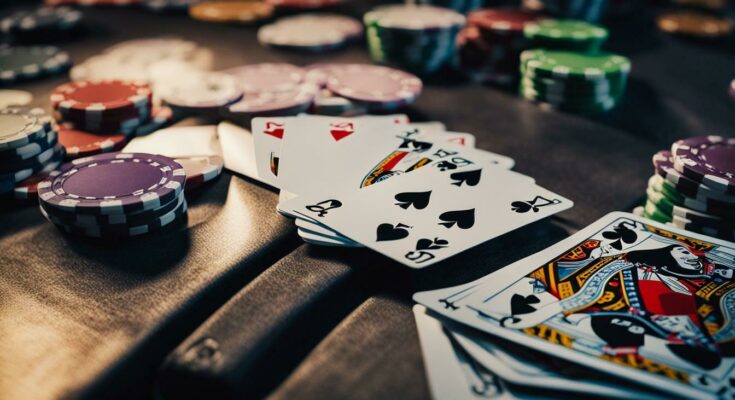When we think of gambling, poker is often one of the first games that come to mind. But why is poker considered a form of gambling? Is it another luck-based game, like the slot machines or roulette wheel?
In this section, we will explore the relationship between poker and gambling. We will compare poker to other forms of gambling and analyze why it is classified as gambling. Understanding these nuances will help us appreciate the unique aspects of poker and its role in the broader gambling industry.
So, let’s dive in and explore the reasons behind why poker is so often linked to gambling activities.
The Risk and Thrill of Poker
Poker is a game that is closely associated with gambling. The intense focus and concentration required during a poker session can evoke a similar level of excitement and adrenaline to other forms of gambling. This is one of poker’s key gambling aspects, making it so appealing to players.
A certain allure to the unpredictability of poker draws players in. With each hand, there is an element of chance involved, but there is also an opportunity to use skill and strategy to tilt the odds in your favor. This is what makes poker such a fascinating game to play.
Players who can read their opponents and make informed decisions based on their betting patterns and body language are more likely to succeed in the long run. This is why poker is not just a game of luck, but also a game of skill. The psychological factor of poker and gambling psychology cannot be overlooked. Understanding your emotions and those of your opponents is an important part of being a successful poker player.
Although the risk and thrill of poker can be exciting, it is essential to remember to gamble responsibly. It is easy to get caught up in the heat of the moment and make impulsive decisions, but this can quickly lead to losses. Good bankroll management and a solid understanding of the game’s rules and strategy are essential for any player who wants to succeed in the long term.
In conclusion, the gambling aspects of poker and its ability to evoke thrill and excitement make it such a popular game. However, it is essential to acknowledge the role of skill and strategy in the game, distinguishing it from other gambling forms. Understanding poker and gambling psychology helps players make better decisions and improves their chances of winning.
Strategy in Poker versus Gambling
While poker is classified as a form of gambling, significant differences exist between the game and other traditional gambling activities. One of the most notable differences is strategy’s role in poker, unlike luck-based games like roulette or slot machines.
In poker and gambling, there is always an element of chance involved. However, in poker, players can use their skills and knowledge of the game to make strategic decisions that can influence the outcome. This is not the case with most other forms of gambling, where the outcome is determined entirely by chance.
Another similarity between poker and gambling is the use of betting. In both activities, players place bets based on their perceived chances of winning. However, in poker, players can also use their betting to influence the behavior of their opponents, making it a game of skill as much as chance.
Despite these similarities, there are also significant differences between poker and gambling. Whereas gambling is often associated with quick wins and losses, poker requires patience and a long-term strategy. Additionally, poker is a social game that involves interaction with other players, whereas most forms of gambling are solitary activities.
While poker may be classified as a form of gambling, it stands apart from other traditional gambling activities due to the significant role that strategic decision-making plays in the game. Rather than relying solely on luck, poker players can use their knowledge and skill to make calculated bets and outmaneuver their opponents.
Poker’s Place in Casinos
Poker has a unique place within the casino industry as a gambling game. While other games rely solely on luck, poker involves skill and decision-making, making it a favorite among many gamblers.
Unlike slot machines or roulette, poker requires players to use strategy and read their opponents. It’s a game that rewards patience and careful decision-making, making it a favorite of both casual and professional players.
Poker has also undergone significant changes over the years as a casino game. In the early days of Las Vegas, poker games were played in back rooms and private clubs rather than on the main casino floor. However, as the popularity of poker grew, many casinos began to incorporate it into their primary offering.
Nowadays, many large casinos have dedicated poker rooms where players can compete against each other. These rooms often feature high-stakes games and professional players looking to win big.
Poker’s place as a gambling game in the casino industry is secure. Its unique blend of skill and luck, combined with its popularity, ensures that it will continue to be a favorite of players for years to come.
Is Poker Considered Gambling Because of the Thrills It Provides?
Some people argue that card poker thrills uncovered are what make the game so enticing, blurring the lines between skill and chance. While there are elements of gambling in poker, the strategic aspects and psychological elements also play a significant role in the game, leading to a broader debate on its classification.
Conclusion
In conclusion, we have explored the reasons why poker is classified as a form of gambling. We have looked at the similarities and differences between poker and other gambling activities and the role of poker within the casino industry. Through our examination, it becomes clear that although poker shares some common elements with other forms of gambling, it also distinguishes itself through the skill required to play the game.
The risk and thrill associated with poker make it an exciting and popular game for many players. However, poker also involves psychological aspects that can impact a player’s decisions and outcomes. The strategic nature of poker sets it apart from purely luck-based gambling games, making it a favorite among those who enjoy a challenge.
Poker’s place within the casino industry is unique, with the game often attracting a dedicated following of players. Despite being a form of gambling, poker requires a level of skill and decision-making that other games like slots and roulette do not. For this reason, poker is often viewed as a more respectable and legitimate form of gambling.
In summary, while poker is undoubtedly a form of gambling, it distinguishes itself through its strategic nature and the skill required to play it. For those who enjoy an exciting and challenging game, poker offers a unique experience within the broader gambling industry. Overall, “Why is poker gambling?” can be answered by examining the game’s individual characteristics and place within the larger gambling world.




